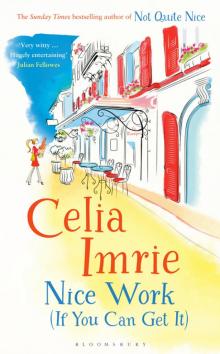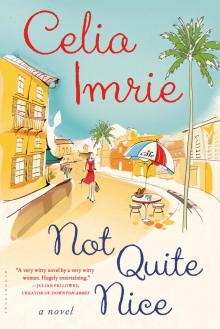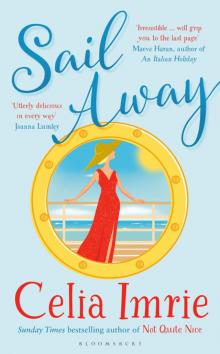- Home
- Celia Imrie
Nice Work (If You Can Get It) Page 9
Nice Work (If You Can Get It) Read online
Page 9
‘Perhaps you had the conversation with Jean-Philippe, while I was making the tea? I know nothing about football, I’m afraid, Destiny.’
Destiny laughed so loud that her little dog jumped with fright. ‘Me neither. He’s just a wicked hunk, that’s all I care about. Now shut up, Stanny sweetie, and let’s order.’
Sally prepared for a long hour during which she was unlikely to taste a morsel.
10
Theresa sat at her glass and wrought-iron table with a large clean pad of paper. She wanted to jot down menu ideas, recipes. The danger of this DIY-style rush to open a restaurant had caused her to lose the point of why she had agreed to be part of it in the first place. She should be cooking, experimenting.
As she wrote down a pretty random list of dishes, she realised that they hadn’t even really discussed a theme for the menu. Would they be serving typical Mediterranean dishes, or perhaps traditional British fare? They could even look into presenting local specialities. Then an idea struck her. How about fusing the best of British and Niçoise food – let’s say mashed potato and onion champ with red mullet, for instance?
It seemed a good plan. She made a list in two columns: Local and British. Afterwards she could write them on to index cards and assemble some interesting blends.
She was right in the middle of dreaming up those scrumptious ingredients, lost in her culinary world, when the phone rang.
It was Mr Jacobs calling from the office in London.
‘Theresa! I am fascinated by this whole project you’re involved in. The one thing that keeps coming to the top of my head is what’s in it for the vendor?’
Theresa moved away from the paper-littered table and sat in her armchair.
‘Do you mean that everything is all right for us?’
‘Well, yes,’ Mr Jacob’s voice betrayed doubts. ‘I simply don’t understand the lessor’s position.’
‘He is very young . . . ’
‘He may well be, but this document is legally tight. It’s just that the terms seem to favour you very well. I was so worried by this that I did make a little check on the French registry to be certain that the young fellow wasn’t in the business of renting you London Bridge or the Mona Lisa.’
‘Are you saying that the place isn’t his to dispose of?’
‘No. That’s the whole problem, for me. It is legally his and the contracts are watertight. But something just doesn’t feel right. I was wondering about money laundering, and all that kind of thing.’
Theresa took a deep breath. ‘Now you’re worrying me, Mr Jacobs.’
As Theresa spoke, she doodled on the pad by the phone and saw that her answering machine was blinking. A message was waiting.
‘I don’t mean to worry you, Theresa. As I say, everything is fine. It sounds a very interesting, not to mention romantic, project. And I wish you very good luck. Perhaps when holiday time comes around I’ll nip down to the South of France for a weekend and visit the restaurant once it’s up and running.’
After the call, Theresa remained in the armchair for a while, gazing out at the harbour and thinking.
It was all taking on a strange dreamlike quality and she wanted to pinch herself to make sure she was awake.
She stood up and pressed play on the answering machine.
‘Mummy, it’s Imogen . . . ’ For some reason Imogen seemed to be whispering into the machine. ‘Can you ring me . . . asap?’ Then her voice changed to a loud call – ‘Coming!’ – and she was gone.
Theresa picked up the phone and started dialling Imogen’s number.
A hammering on the door interrupted her. She put down the phone and went to answer it.
It was William. He strode in, put his briefcase on the table and clicked it open. ‘We need an alcohol licence. There’s a special one, I’m told, which is for restaurants, and gives us the freedom to sell wine, liquors less than eighteen per cent proof, aperitifs, rum and spirits. It’s naturally the most expensive one, but we cannot think of opening without it.’
‘Of course,’ said Theresa, fiddling with her coffee machine and laying out cups. ‘Even Disneyland, here in France, had to get one. No self-respecting French person would dream of eating anywhere unless it’s possible to have a glass of wine.’
‘We also need to acquire a Protection of Minors notice, an official list of opening hours approved by the préfecture, a commission de sécurité from the mayor, have inspections by the fire brigade, police and the consul general, blah-blah-blah.’
Another rap at the door, and Theresa was relieved to see Carol and Benjamin.
William stood at the table, fingering through the papers. ‘You see, I’ve not just been sitting on my arse. We also need a safety and hygiene inspection and they obviously have to continue on a regular basis. Plus we need to join the National Restaurant Association. Do we want a music licence?’
‘No,’ said Theresa, at the same time that Benjamin said yes.
‘Planning a Friday-night karaoke session are we, Benjamin?’ asked William.
‘Actually, William, I was thinking about ambient music, some jazz or cocktail piano music. That always adds to the atmosphere.’
‘I think we’d better think about that once we’re making a bit of this outgoing money back,’ said Theresa, remembering her early days in Bellevue-Sur-Mer, when Carol had cajoled her into giving cookery classes to balance the necessary and sometimes extravagant expenses of her move. ‘How long will all those things take?’
‘I would hope, if I hang around making sure we stay on the top of the lists and we don’t run into any major roadblocks, about ten days. Thank the Lord this venue once had a licence before. Apparently if you want to get one from scratch, it’s perfect hell.’
‘Small mercies,’ said Theresa, putting the cups on to a tray and carrying them over.
‘And we were very lucky that the old girl Magenta kept paying the licence – even from the retirement home. That’s saved us a lot of time and money.’
‘Lucky?’ said Theresa, reminded again of Mr Jacobs’s call. ‘It sounds rather odd. Why would she do such a thing?’
‘Oh, you know what happens,’ said Carol. ‘No one actually believes that they’re getting too old for anything. She probably thought she’d get better and come back to it.’
‘Perhaps she hoped her son would continue the trade,’ said Benjamin, picking up a biscuit and dunking it into his coffee.
‘I thought we were dealing with the grandson?’ said Theresa. ‘I was also wondering who bought all that equipment in the cellar. It’s not that old, you know.’
‘Maybe whoever was running it as a giftshop also had dreams of opening it again as a restaurant,’ suggested Benjamin.
‘Carol?’
‘The boy didn’t say anything about that to me. Perhaps it was his father?’
‘Hmmm.’ William hooded his eyes. ‘Well, it’s there and it’s part of the deal so . . . ’
He looked round the team expectantly.
‘Right, if you agree we should continue – Carol, Theresa – Benjamin and I will head back to the mairie to get everything officially submitted.’
Theresa glanced towards the clock.
‘No one’s going to be there till at least two-thirty, William. Why don’t you go over everything that has to happen next with Carol and Benjamin while I rustle up the lunch?’
11
Sally could not believe what had just happened. Stanislav had paid the bill saying, ‘Now, Sally, I’m sure you’ll enjoy giving Destiny a tour of all the local tourist hotspots.’
There was no way to wriggle out of it.
Putting on a bright smile, she walked Destiny through the winding alleys of the historic quarter.
They strolled first past the remaining perfumes of the morning’s flower market, now swept-up little piles of petals and stems. As they crossed the Place Pierre-Gautier, Sally pointed out the magnificent Palace of the Kings of Sardinia, gloriously bright-white against the China-blue sky.
Sally tried to simplify the complicated history in words of one syllable. ‘This area used to be owned by them. There isn’t a King of Italy any more. It’s now the Préfecture, a kind of official city hall.’
‘My husband’s over here looking for a place. Do you think they might sell up?’
Sally couldn’t even start to explain.
‘Doubt it,’ she mumbled, ‘but I do know a bit about the property market over here. What kind of budget were you thinking of?’
‘Oh I don’t know, Sally. Probably around six mill.’
‘Six thousand?’ asked Sally, translating the French mille.
‘No, didn’t you hear? Million. Six million.’
Sally gulped as they turned into one of the narrow alleyways.
She knew about the local property market but not for values over a million.
‘So where is your husband now, Destiny?’
‘Boys will be boys, Sally. He’s been hooking up with his football mates for lunch, and he’s due to take the afternoon off, larking around with Stanny. I think they’re going out on his boat. I don’t like boats, myself. I only have to look at the sea to be sick.’
Changing the subject, Sally gave Destiny the spiel she always gave friends she was showing round the Vieille Ville, pointing out the good cafés and ice-cream parlours, the churches and ancient buildings.
‘It’s very old-fashioned, this place, don’t you think?’ said Destiny, finding that her stiletto heels were not very effective when walking on cobbles.
‘It’s the Old Town,’ replied Sally.
‘Well, that explains it. I like new things.’ Destiny leaned on Sally’s arm to help keep her balance. ‘Isn’t there a New Town, or a more modern bit of Nice we could go to?’
‘What do you like?’ asked Sally, at a bit of a loss now to know what to suggest. Extricating her arm and instead taking Destiny’s elbow, she offered faintly, but not holding out much hope: ‘The Modern Art Gallery?’
‘I like shops,’ said Destiny. ‘Shoe shops, fashion boutiques . . . ’
Sally took a deep breath and steered Destiny towards a steep flight of stone steps. ‘Then we need to go across the new gardens. You’ll enjoy them. Surprising fountains and mist you can walk through, comfy wooden seats. It’s very pretty. Green lawns, flowerbeds where only a couple of years back it was a horrible concrete bus station and car park . . . Many years ago it used to be a dried-up old river.’
‘I’m not fond of nature,’ said Destiny. ‘I prefer buildings. You don’t get so many insects in buildings.’
‘So I’ll take you to Rue Paradis.’
‘Paradee?’ said Destiny. ‘My dad used to say a word like that. It was something to do with his drum kit. Paradee . . . ’
‘Paradiddle,’ said Sally, recalling her Saturday-morning TV shows, when she was made to have a go at playing the drums. ‘This Paradis is a street. All the fashion shops are along there.’
‘Paradiddle, paradee,’ said Destiny.
‘There’s – Chanel, Armani, Hugo Boss. Paradis is French for Paradise.’
‘That’s what I love about the French,’ Destiny smiled. ‘They really know the meaning of words.’
12
Theresa tried phoning Imogen’s mobile a number of times during the afternoon and evening but always got the machine. She tried phoning the home line too, which also switched instantly to voicemail.
She started getting worried. What could have been so urgent? And why was Imogen whispering to her but calling out cheerily to some mystery person in the background? Theresa’s head flooded with images of burglars and other criminals holding Imogen and the children hostage in their kitchen.
She wasn’t sure whether to try contacting one of her friends and asking them to drop round.
She slept fitfully and woke very early the next morning. Allowing for the one-hour time difference, it was certainly too early to phone anyone in London.
To keep herself occupied, she got up and went across to the restaurant. She was impressed by what she found. The plumbers had worked hard all day the day before, and the sink and hobs were now installed. The washroom still looked a mess but was obviously coming together, and once the basins and toilets were installed it would only take a tiler to make the place look wonderful.
Today, while they would continue work on the plumbing for the washbasins and lavatories, electricians would move in and start putting in the electric oven and wall sockets around the countertops in the kitchen.
The whole place looked bright and cheery, she had to say.
The only dismal area was now the dining room.
Theresa went down into the cellar. Now that most of the equipment was out of the way, she could see that the space was much more capacious than she had at first thought. It would be a very useful storeroom.
Carol and Benjamin could start whitewashing the walls today, then they should look at getting some shelving put up and installing some wine racks and perhaps a small desk to act as an office.
As Theresa turned towards the stairs something skittered away from her feet and she looked down to see a somewhat fancy red and golden Zippo cigarette lighter lying on the tiled floor. Someone must have dropped it yesterday when they were lugging the equipment up the steps.
She picked it up, and slipped it into her pocket.
A rap on the front door indicated the arrival of the electricians and plumbers. She ran up the steps to let them in.
As there was nothing much she could do in the restaurant while it was filled with a gang of electricians, carpenters, plumbers and plasterers, she went back to her apartment to work on other things and soon try Imogen again.
William was waiting on the doorstep.
‘Do you have any idea how much a grande licence costs?’
‘I have no idea, William. This was your area.’ Theresa ushered him in and cleared a space on the table.
‘Have a guess,’ said William, crossing the threshold. ‘Go on.’
‘I really have no idea, William. Perhaps a thousand euros.’
‘Not even in the right ball park.’ William gave a braying mock-laugh. ‘Wait for this, Theresa. I think you’d better sit down first. A grande licence costs between ten and twenty thousand euros.’
‘Whoa . . . maybe we should get a not-so-grande licence.’
‘Ha-bloody-ha, Theresa. A grande licence is the restaurant-standard alcohol licence.’ William paused, pursing his lips, allowing Theresa to register before carrying on. ‘And in case you didn’t hear me the first time, I said between ten and twenty thousand euros. Money up-front before we can open. Who is going to foot the bill for that?’
‘We’ll have to find a way. Yes, it’s expensive, but we can’t open without one. Go ahead William – your department, end of subject,’ said Theresa. ‘Coffee, or something stronger?’
William thrust up his palm. ‘Don’t even mention alcohol. I’ll have a café crème, please, Theresa.’
A knock on the door.
Carol stood there with a huge suitcase and a duvet wrapped over her shoulders.
‘The repo men – or whatever they’re called over here – just hauled me out of bed and threw me into the street. I’m officially one of the homeless.’
She sank down on to the chair beside William and burst into tears.
While she was sobbing there was another knock on the door. This time it was Benjamin.
‘I just saw Carol, lugging a suitcase like a bag-lady . . . Oh, you’re here.’
He sat in the third seat.
As Theresa once more walked to the table with a tray of coffees, the mobile phone in her pocket started vibrating. She staggered across the room, put down the tray and fumbled in her pocket. The phone was right at the bottom. She pulled out her bus pass, a small packet of tissues and the lighter she had picked up this morning before retrieving the phone
.
‘Allô! Allô!’ But the phone had stopped vibrating.
She looked at it.
It had been Imogen.
Damn.
‘One minute, guys. If I may make a quick call.’
She turned and dialled Imogen, but, annoyingly, it switched immediately to voicemail. Imogen must have started another call. Theresa left a message: ‘It’s Mummy, darling. I know you’re trying to get me. I hope everything’s all right. You know where to find me. Keep trying and so will I.’
When she got back to the table Benjamin was admiring the Zippo lighter.
‘I always wanted one like this. It was a limited edition, you know.’ He flicked it open and lit the flame. ‘But isn’t it gorgeous. Look at those crosses and skulls. Wow!’
‘You don’t need a lighter any more, though, do you, Benjamin?’ William gave a tight smile. ‘Not now that you’re off the drugs.’
‘I don’t need one, no. But it is still lovely. I could use it to light birthday-cake candles and things.’ William glared and Benjamin placed the lighter back on the table, leaving Theresa to pick it up. ‘Not what I’d expect you to have, Theresa.’
‘No, it’s not mine, actually. I found it this morning on the floor in the cellar at the restaurant. I was wondering whether it might have been yours.’
‘If only,’ said Benjamin.
‘Then it must belong to one of the workmen.’ As Theresa slipped it back into her pocket she noticed William giving her a sidelong glance.
They continued the conversation about money, as William sat with a calculator and large ledger, jotting down notes and doing sums.
They spent the morning working out plans for the decorating, and maybe the hiring of extra staff. They discussed advertising and marketing and finally chose a day to open.
‘I think we should open quietly, like a trial run,’ said William.
‘Then have a grand opening night,’ said Carol. ‘With stars and glamour and popping paparazzi taking photos for all the big magazines.’
‘We should be so lucky.’ Theresa scribbled on a piece of paper. ‘We should make sure to invite all the reviewers too – Michelin, Gault et Millau, Time Out, Amex, local papers . . . ’

 A Nice Cup of Tea
A Nice Cup of Tea Nice Work (If You Can Get It)
Nice Work (If You Can Get It) Not Quite Nice
Not Quite Nice Sail Away
Sail Away